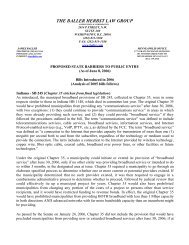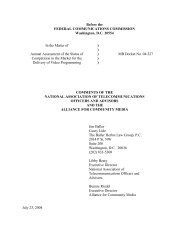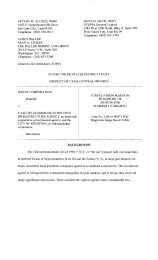Petition for Writ of Certiorari
Petition for Writ of Certiorari
Petition for Writ of Certiorari
You also want an ePaper? Increase the reach of your titles
YUMPU automatically turns print PDFs into web optimized ePapers that Google loves.
5<br />
(Separate Statement <strong>of</strong> Chairman William E. Kennard and Commissioner Gloria Tristani); and id. at 1173 (Separate<br />
Statement <strong>of</strong> Commissioner Susan Ness). The Missouri Municipals then filed a petition <strong>for</strong> a review <strong>of</strong> the<br />
Commission?s order. Southwestern Bell Telephone Co. and the State <strong>of</strong> Missouri intervened in support <strong>of</strong> the<br />
Commission?s decision.<br />
We have jurisdiction to review final orders <strong>of</strong> the Commission under 47 U.S.C.A. § 402(a) (West 2001)<br />
and 28 U.S.C.A. § 2342(1) (West 1994).<br />
II.<br />
We review agency determinations under the two-step process set <strong>for</strong>th in Chevron U.S.A., Inc. v. Natural<br />
Resources Defense Council. Inc., 467 U.S. 837 (1984). First, we must determine whether congressional intent is<br />
clear from the plain language <strong>of</strong> the statute. If congressional intent is clear, a contrary interpretation by an agency is<br />
not entitled to deference. If the language <strong>of</strong> the statute is ambiguous, however, and the legislative history reveals no<br />
clear congressional intent, we must defer to a reasonable interpretation <strong>of</strong> the statutory provision made by the<br />
agency. Ragsdale v. Wolverine Worldwide, Inc., 218 F.3d 933, 936 (8 th Cir. 2000), affd, 122 S.Ct. 1155 (2002).<br />
A second plain-language standard also applies in this case. The Supreme Court requires that Congress<br />
make a plain statement that it intends to preempt state law where the preemption affects the traditional sovereignty<br />
<strong>of</strong> the states. Gregory v. Ashcr<strong>of</strong>t, 501 U.S. 452, 460-61 (1991). In Gregory, the Court “confronted a statute<br />
susceptible <strong>of</strong> two plausible interpretations, one <strong>of</strong> which would have altered the existing balance <strong>of</strong> federal and<br />
state powers. . . [and] concluded that, absent a clear indication <strong>of</strong> Congress?s intent to change the balance, the<br />
proper course was to adopt a construction which maintains the existing balance.” Salinas v. United States, 522 U.S.<br />
52, 59 (1997). As the Court pointed out in Salinas, however, a “statute can be unambiguous without addressing<br />
every interpretive theory <strong>of</strong>fered by a party. It need only be ‘plain to anyone reading the Act” that Congress<br />
intended to alter the federal-state balance in the relevant area. Id. at 60 (quoting Gregory, 501 U.S. at 467). Thus,<br />
the Gregory plain-statement rule does not require courts to limit a statute?s scope where Congress?s intent is plain,<br />
and, in fact, “[a]ny other conclusion, while purporting to be an exercise in judicial restraint, would trench upon the<br />
legislative powers vested in Congress by Art. I, § 1, <strong>of</strong> the Constitution.” Salinas, 522 U.S. at 60 (quoting United<br />
States v. Albertini, 472 U.S. 675, 680 (1985)).<br />
In summary, the Gregory rule requires us to determine whether the statutory language plainly requires<br />
preemption. Gregory does not mandate that we conduct a balancing test <strong>of</strong> the federal interests against the state<br />
interests or that we delve into the wisdom <strong>of</strong> the competing federal and state policies. We do not assume that<br />
Congress exercises its Supremacy Clause power lightly, however, and we must be “certain <strong>of</strong> Congress? intent”<br />
be<strong>for</strong>e we find that federal law overrides the balance between state and federal powers. Gregory, 501 U.S. at 460.<br />
Even so, no matter how great the state interest, we should not strain to create ambiguity in a statute where none<br />
exists. See Salinas, 522 U.S. at 59-60. Accordingly, we ask a single question, is the statute?s meaning plain? If so,<br />
that ends our analysis, with the result that it must be held that Congress has preempted state law.<br />
The dispute hinges on the meaning <strong>of</strong> the phrase “any entity” in § 253 <strong>of</strong> the Act. More precisely, do the<br />
words “any entity” plainly include municipalities and so satisfy the Gregory plain-statement rule? We hold that they<br />
do. Accordingly, because § 253 satisfies the Gregory plain-statement rule, it also satisfies Chevron?s clearstatement<br />
rule and thus the Commission?s contrary interpretation cannot stand.<br />
We begin with the language Congress used, and, because the statute does not define the term “entity,” we






